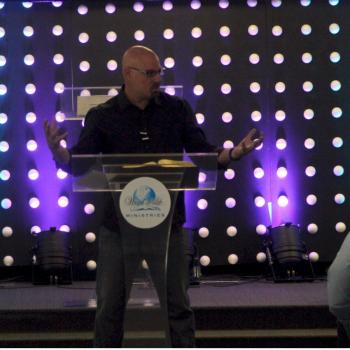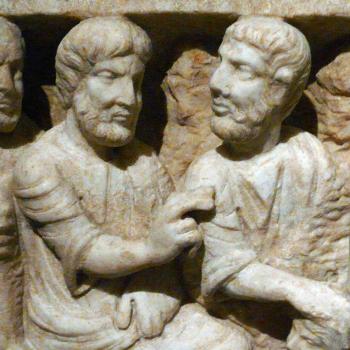A popular story in philosophy, with unknown origins and dozens of variations, is that an ancient philosopher proposed that the world rests on an elephant (or a plate or something else), which rests on a turtle. Supposedly, when someone challenged him (in these stories ancient philosophers are always male), asking what the turtle rests on, the answer was, "It's turtles all the way down."
Philosophers use the story when talking about the problem of infinite regresses. It has been particularly useful when rejecting the need for an ideal world: if this world can only be explained by referring to an ideal world, what explains the ideal world? If another ideal world, then we can repeat the question, "What explains that?" and by continuing to ask we create an infinite regress of explanations, which is no explanation at all.
If nothing behind or prior to the ideal world explains it, if we must stop our explanation there, then why not just stop with the material world? Why not material all the way down? That's the position that Mormons take: it's bodies, material, all the way down.
Joseph Smith taught, "There is no such thing as immaterial matter. All spirit is matter, but it is more fine or pure, and can only be discerned by purer eyes" (D&C 131:7). He didn't explain what it means for matter to be "more fine or pure," but the central part of this teaching is clear: everything is material even if there is material that we presently cannot see or understand. There is only one ontological universe, the material one.
That materialism distinguishes Mormons from other religions significantly, for most religions make a distinction between this material world and a spiritual world that is metaphysically different than this world. For Mormons, however, there is no metaphysical gap between the world in which we live and the world inhabited by God.
Perhaps Mormon materialism explains the inordinate interest in physical science among Mormons. Utah, which is about 60 percent LDS, produces a disproportionate number of scientists, and the physical sciences are heavily represented and well-funded at the LDS university, Brigham Young University. It wasn't a surprise to Mormons when the two Mormon candidates for the Republican nomination for president earlier this year both took pro-science positions. For most thoughtful Mormons, there is no alternative.
Mormon materialism may also explain the interest that so many of us have in business: seeing no distinction between this world and the spiritual world, perhaps Mormons feel free to engage in material pursuits, in ordering and manipulating the physical world in imitation of God.
There is an obvious danger in assuming that my engagement in the capital, real estate, and other exchanges of the physical world is justified by the fact that God, too, is engaged in creating, ordering, and "running" the physical world. If my engagement isn't imbued with the same attitude toward that world and that engagement that he has, I may well be creating an idol rather than worshiping God through what I do. But the absence of an unbridgeable gap between the divine world and the human world gives us the possibility of a holy life in business.
I hope that the Mormon belief that everything is material means that we understand the world that environs us as the same world inhabited by God, and that we respond to it accordingly. I hope that because we are materialists Mormons see the world as neither a fallen and depraved place nor a place that can be used and used up with indifference.
Perhaps the Mormon belief in bodies all the way down explains the tone of familiarity that inhabits much LDS talk about the Father and about the Son. God is not mysterious to Mormons in the same way that he is mysterious to many others, and that may allow us to more easily address him and think of him in familial terms.
Of course the differences between a divine being and a mortal one are enormous, and that is true whether one believes that the divine being is embodied or not. He is morally perfect; we are not. He is immortal; we are not. His glory is unsurpassable; to the degree that we have any glory at all, it comes from him. Nevertheless, it's bodies all the way down, for us. There is nothing metaphysically prior to or supportive of our material existence.
Consider one of the least consequential differences: we assume that the differences between his habitation and ours are immeasurably significant. In spite of that Mormons have the temerity (most non-Mormons would call it naïveté, at best) to give the place of God's habitation a specific location. It is "nigh unto Kolob" (Abr 3:9), a star in an undesignated location.





